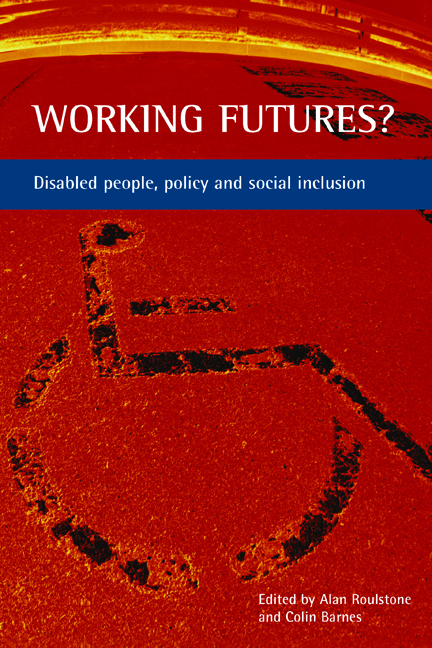Book contents
- Frontmatter
- Contents
- List of figures, tables and boxes
- Preface
- Acknowledgements
- List of abbreviations
- Notes on contributors
- Introduction Working futures: disabled people, employment policy and social inclusion
- Part One Work, welfare and social inclusion: challenges, concepts and questions
- Part Two The current policy environment
- Part Three Towards inclusive policy futures
- Index
- Also available from The Policy Press
six - Disability frameworks and monitoring disability in local authorities: a challenge for the proposed Disability Discrimination Bill
Published online by Cambridge University Press: 18 January 2022
- Frontmatter
- Contents
- List of figures, tables and boxes
- Preface
- Acknowledgements
- List of abbreviations
- Notes on contributors
- Introduction Working futures: disabled people, employment policy and social inclusion
- Part One Work, welfare and social inclusion: challenges, concepts and questions
- Part Two The current policy environment
- Part Three Towards inclusive policy futures
- Index
- Also available from The Policy Press
Summary
Since the implementation of the Disability Discrimination Act (1995) (DDA), employers have increasingly put in place policies and practices designed to shape their disability management practice (EOR, 2003; IRS, 2003; Hurstfield et al, 2003). The amendments to the DDA in the form of the Disability Discrimination Bill (DDB) (now the Disability Discrimination Act 2005) are likely to increase such activities. While all employers are required to ensure that they comply with the legislative requirements, in the public sector the replacement of Compulsory Competitive Tendering (CCT) with ‘Best Value’ has placed further requirements on Local Authorities (LAs) to improve their service provision and their corporate employment policies and practices in order to ensure the social inclusion of different groups within their local community. These initiatives are being given further impetus via the DDB which includes a disability equality duty on public authorities to have due regard to:
… the need, where opportunities for disabled persons are not as good as those for other persons, to promote equality of opportunity between disabled persons and other persons by improving opportunities for disabled people. (DRC, 2003, p 7)
Equality, therefore, has become a mainstream issue in local government and is evidenced in The equality standard for local government, which aims to “combat the institutional processes that lead to discrimination and which form part of the culture and administration of governance in Britain” (LGEO, n.d., p 1). Mainstreaming equality according to Speeden (2004, p 1) means:
… making equality a central consideration of all aspects of employment and service delivery …. In practice this means looking at services and practices in a different way to the past – moving away from a uniform approach to service management towards one that recognises difference. Needs within the local community are shaped by race, ethnicity, gender, disability, religious belief, sexuality and age: mainstreaming should ensure that these aspects of community life are taken into consideration in employment and in the delivery of services.
As part of achieving Best Value and mainstreaming equality, central government has provided indicators to be used in auditing progress on equality and social inclusion in the form of Best Value Performance Indicators (BVPIs).
- Type
- Chapter
- Information
- Working Futures?Disabled People, Policy and Social Inclusion, pp. 91 - 106Publisher: Bristol University PressPrint publication year: 2005



